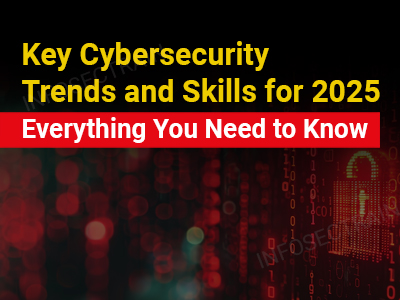The rise of AI, the proliferation of data, and new regulatory landscapes will redefine how cybersecurity is approached. As such, professionals in key roles like SOC analysts and penetration testers must adapt their skills to the changing world of cybersecurity.
AI and Automation: A Double-Edged Sword
Artificial intelligence and automation are set to dominate cybersecurity in 2025. On one hand, AI is expected to enhance threat detection and response times, helping organizations identify breaches and vulnerabilities faster than ever. On the other hand, cybercriminals will also leverage AI to launch more sophisticated attacks, including automated phishing campaigns and deepfake fraud.
For professionals looking to stay ahead in this AI-driven era, the skills necessary to combat these threats will be in high demand. Security operations centers (SOC) will see an increasing reliance on AI-powered detection systems, enabling analysts to focus on the most critical tasks. As AI evolves, SOC analyst training will need to incorporate new technologies and methodologies for leveraging AI in threat detection and incident response.
Similarly, penetration testing, which plays a crucial role in identifying vulnerabilities before attackers exploit them, will need to integrate AI tools to simulate more advanced and realistic attack scenarios. This shift will ensure that penetration testers are equipped to assess the vulnerabilities of AI-powered applications, cloud infrastructures, and IoT devices, which are all growing targets.
Cloud Security: A Growing Focus
The shift to cloud infrastructures is accelerating, and by 2025, the majority of organizations will have fully integrated cloud ecosystems. This shift brings new security challenges, from data privacy concerns to the complexity of managing cloud security configurations.
SOC analysts will need to sharpen their expertise in cloud security tools and monitoring systems. As organizations increasingly deploy multi-cloud and hybrid environments, understanding how to secure cloud-native applications, APIs, and virtual environments will be critical. For penetration testers, the focus will shift toward assessing cloud configurations, data storage protocols, and ensuring that cloud security posture management (CSPM) tools are effectively integrated.
Penetration testers, already skilled in traditional penetration testing methodologies, will need to expand their knowledge to address vulnerabilities in cloud environments. Testing security in highly distributed environments will require a mix of cloud-specific penetration testing tools and techniques to exploit weaknesses and prevent breaches.
Data Privacy and Compliance
As global data privacy laws tighten, cybersecurity professionals must be equipped with the knowledge to navigate new regulations like GDPR, CCPA, and upcoming global standards. By 2025, data protection will become even more critical, and organizations will need to demonstrate compliance in the face of increasing scrutiny.
SOC analysts will be expected to integrate compliance requirements into their threat detection protocols, ensuring that security practices align with local and international laws. They must also stay up to date on emerging privacy regulations to help their organizations manage data risks effectively. Penetration testers will need to evaluate how organizations manage sensitive data, identify areas where data protection practices could be circumvented, and proactively address vulnerabilities in data storage systems.
The Increasing Role of Automation in Incident Response
Automation will play a key role in how security teams handle incidents. From automatic threat detection and classification to automated responses that neutralize attacks in real time, the future of incident response will be driven by advanced algorithms and machine learning models.
SOC analysts will need to incorporate automation tools into their workflows, as automating low-level tasks will free up analysts to focus on more strategic, high-level decision-making. Penetration testers will also use automation to simulate attacks on a much larger scale, quickly identifying vulnerabilities and weaknesses that would be impossible to pinpoint manually.
The Need for Enhanced Skillsets
To stay relevant in 2025, cybersecurity professionals must continuously enhance their skillsets. The importance of SOC analyst training cannot be overstated. SOC analysts will need to develop expertise in using AI-powered security tools, understand cloud-native architectures, and be familiar with compliance regulations to prevent threats before they happen.
Similarly, penetration testing will demand an advanced understanding of cloud systems, IoT devices, and AI-driven vulnerabilities. Penetration testers will need to adopt new methodologies and continuously update their toolkits to simulate advanced threats that leverage AI, automation, and new attack vectors.
Conclusion: Preparing for the Future of Cybersecurity
As the cybersecurity industry faces new challenges in 2025, the roles of SOC analysts and penetration testers will become more vital than ever. By preparing for the future with advanced training and skills development, professionals can help their organizations stay ahead of the evolving threat landscape. AI, cloud security, data privacy, and automation will all be critical areas for training and certification, ensuring that today’s cybersecurity experts are ready to tackle the challenges of tomorrow. Embracing these changes will enable professionals to secure their place in the ever-changing cybersecurity workforce, positioning themselves at the forefront of the next wave of digital defense.
In conclusion, adapting to emerging trends in cybersecurity requires continuous learning and specialization. Professionals in SOC analysis and penetration testing must ensure they are equipped with the tools, techniques, and knowledge necessary to navigate the increasingly complex cybersecurity world of 2025. By doing so, they will remain indispensable assets to their organizations and lead the charge in securing the future of the digital world.
Media Contact
Company Name: InfosecTrain (An Intiative by Azpirantz Technologies LLP)
Contact Person: Vikas Agrawal
Email: Send Email
Phone: 18008437890
Address:B-7 (1st floor) Sector 1
City: Noida
State: Uttar Pradesh 201301
Country: India
Website: www.infosectrain.com

